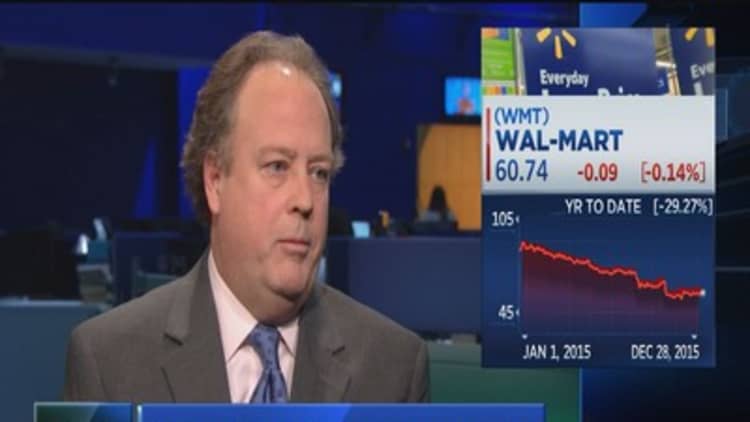Despite all the talk of resolutions, a new year doesn't always equal new opportunities for investors.
Following a disappointing 2015, during which the S&P Retail Index fell more than 9 percent, analysts are cautious on the retail sector heading into 2016. But for the discerning investor, there are select buying opportunities, as consumers' finances slowly improve.
These include companies that are better insulated against certain temporary and long-term headwinds — namely, warm weather and the meteoric growth of Amazon — or those that play into popular consumer categories.
For some of analysts' top picks for 2016, see below.
Amazon
How much higher can they go? Although the online retailer's shares skyrocketed 118 percent to $676 this year, analysts said they still have room to run.
Helping to drive Amazon's performance is the continued growth of its subscription Prime service, which enrolled more than 3 million members worldwide during the third week of December alone. These consumers not only shop with Amazon more frequently, but they also spend more on the site.
"We continue to believe the North America segment maintains a sizable, commanding and expanding lead in the retail space, and for it to increasingly dominate the growing retail e-commerce space," Nomura told investors.
The firm predicts Amazon's North America sales will reach $100 billion by 2017, and account for nearly one-fourth of all U.S. online sales, excluding automobiles and gas. That would compare to 19 percent share in 2014.
The 'Un-Amazon-able'
As bricks-and-mortar retailers struggle to play catch-up with Amazon, those retailers that offer a unique business model or product are better positioned to compete, according to Cowen and Company.
Examples include off-price retailers such as TJX or Ross, whose hodgepodge of merchandise gives consumers the thrill of the hunt. Cowen said Victoria's Secret parent company L Brands, whose products have built an emotional connection with shoppers, also falls into this camp.
The unflappable adversaries
Here's another reason to consider investing in TJX or Ross: Both companies have consistently posted solid sales and earnings results, despite notoriously fickle consumers.
Morgan Stanley listed Ross as one of its top picks for 2016, saying the off-price retailer has not missed its quarterly same-store sales or earnings guidance in more than seven years. Similarly, Nomura named TJX one of its top picks, saying it's well-positioned to benefit from bargain-hunting consumers and a growing store count.
Along with TJX, Cowen referred to L Brands and Costco as "retail Olympians," citing their "best-in-class management teams," "compelling" product and shopping experiences, and consistent traffic results.
Accessorizing your portfolio
The past year was a tough one for handbag companies. Shares of Kate Spade and Michael Kors each tumbled roughly 45 percent, while Coach's stock declined 13 percent. Though overall handbag sales slowed in the second half of the year — due, in part, to consumers buying smaller bags that have inherently lower prices — Nomura listed Coach as a buy for 2016.
"We continue to believe that Coach is on pace with its transformation strategy," said the firm, stating it expects the accessories company to deliver on its promise to post positive same-store sales in North America for its fiscal fourth quarter, which ends June 2016.

Similarly, Morgan Stanley was less cautious on the handbag players, as the category's sales aren't heavily dependent on cold weather in the winter. The firm listed Michael Kors as a "highly controversial" pick for 2016, saying the company provides more opportunity than risk.
More than par for the course for 'athleisure'
Score another point for athletic apparel retailers. In contrast to the declines posted by handbag companies, Nike shares rose 30 percent in 2015, while Under Armour's stock climbed 19 percent. Analysts expect players in this category to continue to outperform in the new year.
Nomura listed Nike, along with outdoor brands Columbia and VF Corp (parent of The North Face) as buys for 2016. And although its shares fell 6 percent in 2015, Morgan Stanley is bullish on yoga outfitter Lululemon, as it builds out its square footage and grows its men's and children's lines.
Home field advantage
A strong housing market has been a boon for home improvement and furnishings stores — a trend experts predict will continue into 2016. In that vein, Citi listed Home Depot and Williams-Sonoma as two of its favorite retailers for the new year, and Cowen named Restoration Hardware.
Handle with care
Many of retail's woes in 2015 can be attributed to one category: Apparel. Whether it was delayed shipments from the West Coast port strikes in the first half, sluggish sales of cold-weather apparel during the unseasonably warm winter months, or consumers refusing to pay full price for clothing, specialty apparel and department stores bore the brunt of the bruising.
In 2015, shares of Macy's slid 47 percent, Nordstrom dropped 33 percent and Kohl's stock declined 22 percent. Among the specialty set, Gap shares fell 41 percent, and Urban Outfitters dropped 35 percent.
Last month, Morgan Stanley downgraded both the specialty retail and department store categories to "cautious" from "in-line."
"2015 illustrated that department stores continue to donate share to off-price, fast-fashion and online pure-play competitors [Amazon], extending nearly three decades of market share losses," Morgan Stanley said. "We expect 2016 to be another disappointing year."





